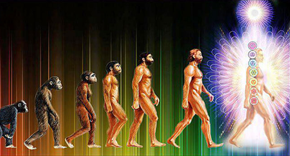The Satipathana Practices by Pir Vilayat Khan: In a series of steps outlined in the Satipathana practices,  Buddha enjoins upon us to objectively watch ourselves in several stages: (i) our body, (ii) our thinking, (iii) our emotions, (iv) our psyche, (v) eventually our consciousness.
Buddha enjoins upon us to objectively watch ourselves in several stages: (i) our body, (ii) our thinking, (iii) our emotions, (iv) our psyche, (v) eventually our consciousness.
These practices corroborate Hazrat Inayat Khan’s teaching; rather than discarding the existential scenario as in yogic Samadhi, they orient one to awakening in life.
| You are yourself the object of your realization; for the secret of all knowledge that one acquires in the world whether worldly or spiritual is the knowledge of the self. |
Consider your body as a transient formation, irrespective of your conscious or volitional participation, without identifying with it. That is, consider your body…
Julius Evola:
| …as a function of the impersonal forces of the world which follow their laws with complete indifference to our person. |
The Sufi View:
Realize that, however inadequate and illusory your notion of yourself is, your involvement with the matter of the cosmos – of the galaxies in your body-ness – is important. It is by dint of experiencing it and through your involvement with it that reality has accrued to you and has proven enriching. It has become part of you. Consequently, discounting your body as not being you would not honor that aspect of you that has accrued through your involvement with the fabric of the universe. Buddhism tends to downplay our personal ‘I’, but although many body functions are conditioned (to wit our autonomic nervous system, our digestion, our breathing, our immune system) we can influence them. We can move our body as we will, we can control our breath and we can decide what we eat. Our personal will can act upon our body. Our frustration or enthusiasm will trigger off the activity of the adrenal glands which are conditioned. There is in us a mind/body connection.
Buddha considers the mind as a formation programmed by the universe, just like the body, irrespective of any ‘I-ness’ whatsoever. Since the personal dimension of our being is dismissed, anatta: there is no individuality. Our thoughts are conditioned.
The Sufi View:
Granted, many of our thoughts are predictable, therefore conditioned, by a programming outside our control, irrespective of our will or initiative. But these thoughts, which are isomorphic with the thinking of the universe, are customized by our identity as an individual.
However, the thinking of the universe coming through us is limited by the human scope within which we constrain it. We often distort and even defile it.
The Sufis concur with Buddha in that one creates an inadequate assessment by limiting one’s thinking to that portion of the thinking of our transpersonal level that emerges at the personal level like the tip of an iceberg.
Can you see that what Buddha refers to as contact (actually perception) with something that arouses covetousness touches off desire? Buddha calls it craving, tanha, which he considers as a mania, asava, an intoxication.
Buddha warns that slipping into our notion of our personal identity (which he considers as illusory) lures one into the vicious circle of the samsaric wheel of repetitive existence. Certainly, our concupiscence does lure our being into the existential world. Therefore he seeks the non-become (the eternal) rather than the process of becoming (the everlasting).
Julius Evola:
| Contacts wound…the primitive anguish which lies at the base of samsaric existence and which produces attachment. |
There can be no doubt as to the number of cases of psychological distress that are due to the frustration of one’s desires. Consequently Buddha enjoins his disciple monks to…
| …Watch over the door of the senses. |
Buddha considers that craving results from ignorance and begets ignorance, whereas liberation from attachment to ‘contact’ of the world sparks realization and enlightenment.
Hence detachment sparks realization.
| The ascetic has given up worldly craving. |
| The ascetic causes the awakening of mindfulness derived from detachment. |
Moreover Buddha considers that involvement in the state of becoming is due to identifying with our body or psyche by succumbing to conditioning.
Detachment would result in:
Buddha:
| Upon perceiving a form the ascetic conceives no inclination. |
| The ascetic causes the awakening of mindfulness derived from detachment. |
No doubt to eschew being inveigled in the rat race one is protected by the imperturbility furnished by detachment. Buddha seeks disintoxication to heal the wounds of attachment.
The Sufi View:
Disintoxication would prove (as we have said) an anesthetic to preserve one from pain. But there is also joy in attachment. Would detachment not alienate one from the fulfillment enjoyed by involvement in life – with all its hopes and disappointments, its challenges and hard lessons, its bewonderment and soul-searching, its fervor and misgivings, its zeal and toil, its passion and compassion, its stress and distress, its joy and despair? Hazrat Inayat Khan does concur with Buddha that indifference conveys freedom:
Hazrat Inayat Khan:
| The real proof of one’s progress in the spiritual path can be realized by testing in every situation in life how indifferent one is. |
| All that produces longing in the heart deprives it of its freedom. |
| If you do not rise above the things of this world, they will rise above you. |
However, Hazrat Inayat Khan cautions:
| He who arrives at the state of indifference without experiencing interest in life is incomplete and apt to be tempted by interest at any moment; but he who arrives at the state of indifference by going through interest really attains the blessed state. |
How can one reconcile these two objectives pulling one in opposite directions?
| Indifference gives great power; but the whole manifestation is a phenomenon of interest. All this world that man has made, where has it come from? It has come from the power of interest. The whole creation and all that is in it are the products of the Creator’s interest. But at the same time the power of indifference is a greater one still, because, although motive has a power, yet at the same time motive limits power. Yet it is motive that gives man the power to accomplish things. |
| So long as a man has a longing to obtain any particular object, he cannot go further than that object. |
Both Buddhism and Sufism see desire as the prime mover leading towards existence. But whereas in Buddhism desire is considered pejorative while liberation from the existential state is coveted, in Sufism our desire is understood to embody the divine nostalgia and to actualize those potentialities in Him/Her as us.
Sufism distinguishes between craving (which is personal) and nostalgia whereby one is giving an, albeit personal, expression to the cosmic emotion sparking the whole process of existence – according to the Sufis Ishq Allah. The very foundation of Sufism, based upon the famous Hadith Qudsi, earmarks ishq (variously translated by desire, love, nostalgia) as the motivation behind the great achievements of our civilizations.
The Sufis consider divine nostalgia as the catalyst of knowing…
Hadith:
| I was a secret treasure and loved to be known [by knowing myself]… |
…which triggers off a descent from the original state in which God knows Him/Herself in the principles of His/Her being to witness how they are implemented when applied in the existential state, in you. But, in addition, they consider divine nostalgia as a catalyst of love – love for the possibility of you who blessedly make the application of the originating principles possible.
Rumi:
| If there had not been a desire and hope of the fruit, why did the gardener plant the tree? |
| The branch came into existence for the sake of the fruit. |
Ibn Arabi:
| What He created was for you. |
| The One who enjoys this independence and has manifested the world did not manifest it by necessity, but He created beings so that they may enjoy existence in order to free them from the solitude of the void and to give them the possibility of acquiring the divine attributes and to make them His vice-regents. All of this was done by dint of altruism, because He chose not to remain the only holder of those things that He gave. |
The existential state must have a purpose other than just offering a leg-up for awakening beyond it. What a loss of an opportunity to escape from it and thereby neglect all the enrichment that it offers!
| The soul reaches a stage of realization where the whole of life becomes to him one sublime vision of the immanence of God. |
| The fulfillment of this whole creation is to be found in man. |
| Manifestation is the self of God; but a self that is limited – a self that makes His perfection known when He compares Himself with the limited self we call nature. |
For the Sufis the existential world is the fulfillment of the divine desire to manifest and actuate the potentialities latent as principles or archetypes in the cosmic code. For the Sufis realization in life is attained by fulfilling the purpose of life which is actuating the splendor behind the existential level in “building a beautiful world of beautiful people.”
In the course of accomplishment new horizons of meaningfulness reveal themselves.
For Ibn ‘Arabi, by cloistering oneself from the world, one misses out on the divine revelation. If one can espy what transpires behind what appears, one will, at least at the first stage, earmark in the existential realm signs, ayat, giving clues to the “intention” behind the human drama. In a second step one notes clues as to the perfection of the divine archetypal attributes exemplified, albeit imperfectly, in our very human nature. The exemplar gives a clue as to the archetype. Therefore the key is to see clearly the relationship between the two poles of this dichotomy.
Ibn ‘Arabi:
| Since the ephemeral conditions manifest the form of the eternal, it is by contemplating the ephemeral that God communicates to us the knowledge of Himself. |
Buddha is seeking freedom – awakening beyond life, while the Sufis enlist our nostalgia to awaken in life and see what is enacted in the human drama. Buddha found that since detachment from desire (itself a conditioning) sparks freedom, it is only when one is free from conditioning that one can awaken from ignorance.
One would miss out on the sense of attainment gained by the venture of commitment to one’s fellow beings – struggling in the drama of life, sharing similar fates, being subjected to the same dangers, trying to live up to one’s values, struggling for self-esteem, confronting iniquity, experiencing solidarity with those who are victims of erring, feeling humility stemming from repentance and pride from steadfastness, discovering sacredness amongst the poor in spirit, upholding belief in an ultimate meaningfulness and goodness despite proof of the contrary.
Moreover, one would lose the privilege of sharing all that has been gained by the bounty of our civilizations – the legacy of our temples, palaces, cathedrals, symphonies, technology, inventions, our inroads into the sub-atomic and outer space, medicine, our social institutions, the inexorable advance of our understanding in wresting the intelligence behind the marvel of our universe, and our chance of contributing further to our pioneering and creative spirit by putting ourselves on the line!
Indeed, how could we avail the universe of the bounty lying in wait in the deep strata of our being unless we put it to the test of the tune, rhythm, consonances and dissonances of the symphony of life?
However, the concurrence with Buddhism comes to light when one sees how easily one gets oneself involved in the proverbial “tempest in a tea-cup.” Furthermore, we react rather than acting out of an awareness of the ideals of our deeper self. Perhaps the clue is in the discrimination between the quest for joy and the quest for felicity. The Sufi dervishes do practice rida, equanimity (which is often paralleled with the Buddhist samatha vipassana, imperturbility), adab, nobility in emotional sensitivity, and akhlaq Allah, the divine manner, as the conditions conducive to manifesting ishq Allah, divine love.
The difference lies in the fact that the Sufis unfailingly ascribe emotion to their source, divine emotion, and consider that the divine emotion is constrained, defiled and distorted at the scale of the individual. One is always seeing, experiencing and feeling things from the diametrically opposite vantage point to one’s own.
But is this not what Buddhists do when consciousness is no longer the consciousness of an “I?” Is this not found in Buddha’s teaching where he refers to “uncoupling” the central aspect of one’s being, illustrated by the stump of the tree, from the samsaric aspect of one’s being, illustrated by that part of the tree that appears above the ground?
According to the Sufis the emotion which one limits within the confines of the scope of one’s consciousness is the personal dimension of divine emotion at a cosmic scale. The mystic encompasses this overwhelming emotion when carried beyond him/herself by divine ecstasy.
Divinity is the exaltation of the human soul.








































